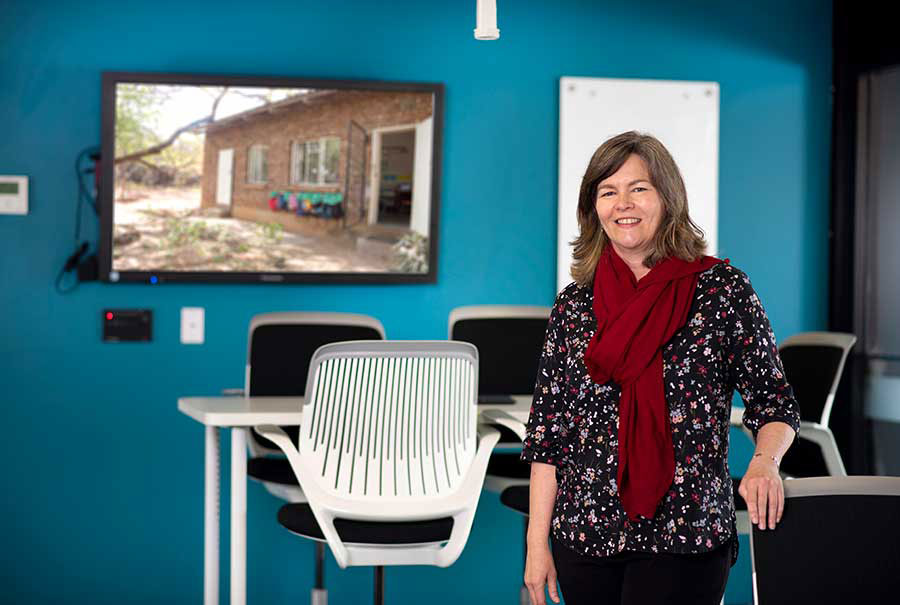Researcher Highlights
Creating caring teachers
Associate Professor Joanne Ailwood is a researcher who explores social theory as it relates to early childhood education, specifically the concept of care and its relationship to teaching.

How can we create caring teachers and build pedagogical relationships across lifespan and place? That is the large question that Associate Professor Joanne Ailwood is exploring through her current research.
In an increasingly regulated field, Ailwood is peeling back the layers that make up the fundamentals of care in early childhood education.
“I think it’s important we talk about the importance of care and that side of the work we do in early childhood education,” she said.
Ailwood says that the concept of care is becoming marginalised in a system that increasingly focuses on accreditation and regulations.
“Within our regulatory environment the work of care is marginalised. What is forgotten is that all teachers care, and care is part and parcel of who we are in the world and an important part of what it means to be an early childhood educator.”
In 2013 Ailwood was awarded a FEDUA Mid-Career Researcher grant to explore relationships between early childhood educators and parents. One of the recurring themes in interviews with both educators and parents was care. She was also one of the National Exceptional Teaching for Disadvantaged Schools team members (along with Prof Jenny Gore, Dr Margot Ford, Dr Drew Miller). This project ran between 2014-2018 and supported highly achieving students to work in schools in areas of disadvantage. Again, one of the themes in this work became about relationships and care.
“This led me to question, what does care mean in the context of early childhood education and care? I am interested in what happens to how we understand early childhood education, children and families when we reinstate care at the centre of our relationships? How can we find ways to put theorising of care and engaging in the human and personal relationships to the front of early childhood education and care? Is it possible to talk of a pedagogy of care in early childhood education?” Ailwood questioned.
“Care isn’t just about changing nappies on time, it’s about learning how to care for other humans, for yourself, and the world we live in. Care is fundamental to human relationships. But care in professional contexts is different to care in personal contexts. We suffer and the field suffers when the care work we do is made invisible,” Ailwood said.
Ailwood says that care is something that is researched, examined, and taught a lot more in medicine and nursing but it’s less likely to be explicitly taught in early childhood education.
“In fields like medicine and nursing care is something that is researched and students also learn what care means in those professional contexts. Care in a professional context is complex and requires a lot of thought and preparation, it is not something that comes naturally. In early childhood education we continue to push back against the perception that our work is somehow natural, and I see a deeper exploration of care in this context as one part of that struggle.”
Outward Bound Mobility: visiting schools in rural Zimbabwe
Ailwood is on the executive committee for the newly established University of Newcastle Centre for African Research Education and Partnerships. Once a year she takes a group of teacher education students from Newcastle to Victoria Falls in Zimbabwe for a study tour with the aim of teaching them about how the majority of the world’s children experience education.
“We stay in Victoria Falls for two weeks. The students are matched up with a classroom teacher in one of two rural schools and are expected to teach and contribute to the classroom in collaboration with the local teachers. During this time the students think through many global and ethical challenges; for example their own privilege, the ethics of taking photos and engaging with social media, and the scale of global educational inequities. After a week with one class and teacher in a rural school, students then visit a series of private schools in town. ” she said.
This experience teaches students about the relative privilege of their own educational experience in Australia and aims to build a global understanding of the scale of educational disadvantage. Since 2015, about 45 students have had the opportunity to travel to Victoria Falls on this study tour and learn about Zimbabwe and to be challenged to think deeply about their place in the international educational landscape.
Associate Professor Ailwood is currently working on a pilot study to look at what the students learn from the tour and the long-term impact it has on their own teaching. Students report that the study tour is life changing, and she would like to find out more about what changes for students and how.
The University of Newcastle acknowledges the traditional custodians of the lands within our footprint areas: Awabakal, Darkinjung, Biripai, Worimi, Wonnarua, and Eora Nations. We also pay respect to the wisdom of our Elders past and present.
